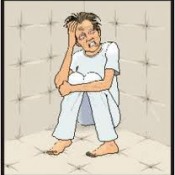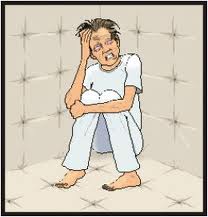
Understanding different mental health diagnosis is very important and I want to share this brief post with you on this afternoon.
Have you ever been so stressed out that it interferes with your mental and daily functioning? You may be experiencing Panic Attacks, Generalized Anxiety or a Brief Reactive Psychosis. The latter is what is more commonly known as a “Nervous Breakdown.” Any of the above diagnosis can come into play when one’s life’s demands become mentally and physically overwhelming. The terms do not necessarily indicate a specific mental illness, however it can indicate an underlying mental health problem which needs medical attention, such as anxiety or depression.
Check out this quick video and let me know what you may be thinking?
Some signs and symptoms of a different mental illnesses vary from person-to-person, and can vary from one culture to another. An episode with one or more of the following can occur in at least one day, for less than a week:
- Disinterest in work (Showing up to work late, sub par work quality, and no interaction with co-workers)
- Disinterest in social life, close friends and family (Not attending family functions, coming up with excuses to not participate in family game night, eating dinner in your room)
- Hallucinations (visual or auditory)
- Disorganized speech (frequent derailment or incoherence)
- Sleep disruption or much longer periods of sleep (waking up in the middle of the night or taking long naps in the middle of the day)
- Significant changes in appetite (increased or decreased eating habits)
- Feelings of persistent anxiety or panic attacks
- Thoughts of dying or wish to die
- Exhibiting aggressive behavior or violent anger
- Heart papitations
- Sweating palms
- Nervousness and paranoia
- Having flashbacks to a prior traumatic event
- Increasing dependence on alcohol or drugs
- Inability to pursue a normal life, normal activities or normal relationship
- Grossly disorganized or catatonic behavior.
There is no “engraved-in-stone” one treatment paradigm for a specific mental illness, but that doesn’t mean help doesn’t exist! In fact, there are several ways to prevent an episode from occurring, such as conventional medicine, natural or nutritional remedies, and some noninvasive therapies. Most patients are unable to pinpoint the inducing factor, but if you are able to distinguish the cause, recognizing the warning signs of a mental illness and reducing and managing stress levels can often produce excellent results and prevent a total mental collapse. Aromatherapy, yoga, reflexology, and massage therapy can all be useful adjuncts to treatment and can greatly assist in aiding relaxation and stress management.
Besides, who could resist the opportunity of a nice massages from time to time?!
Also don’t forget to check out my book @ http://amzn.to/AcFViO




